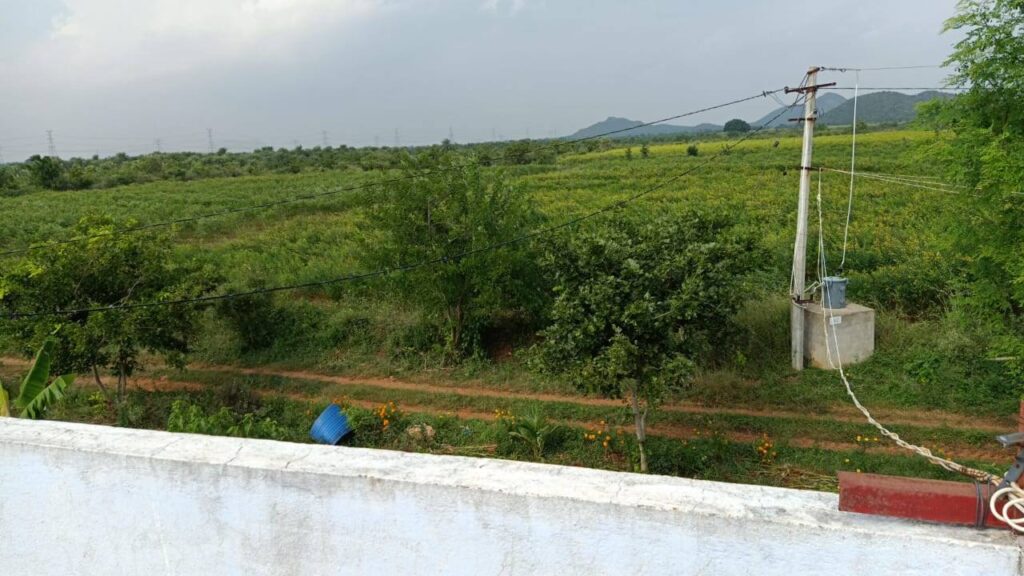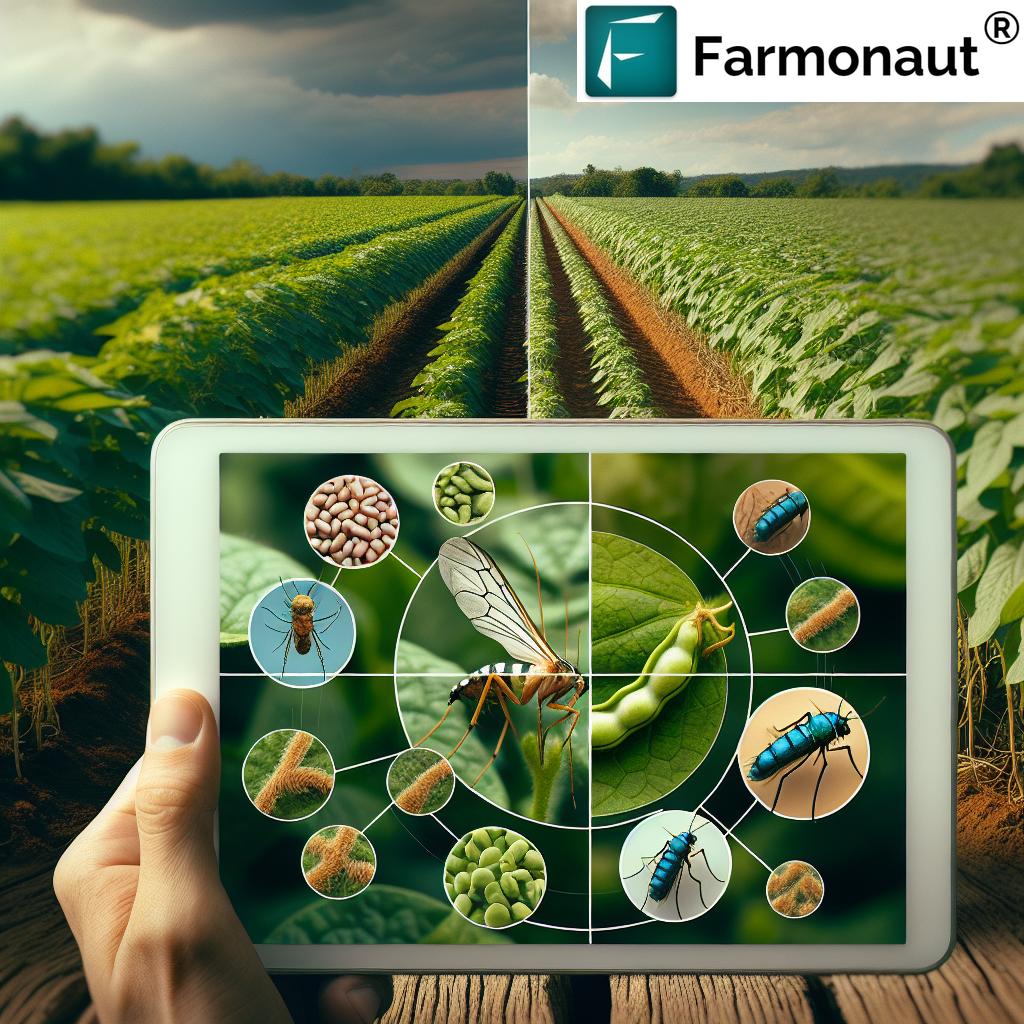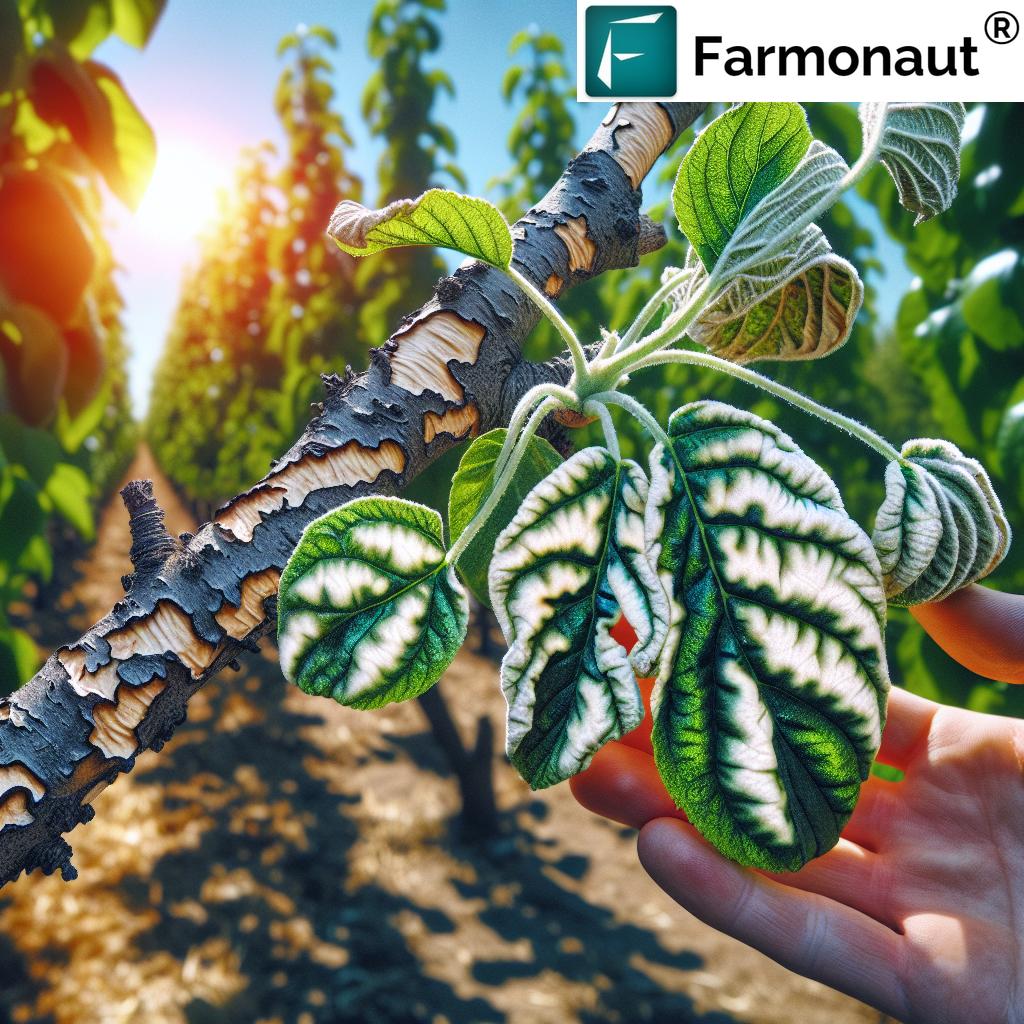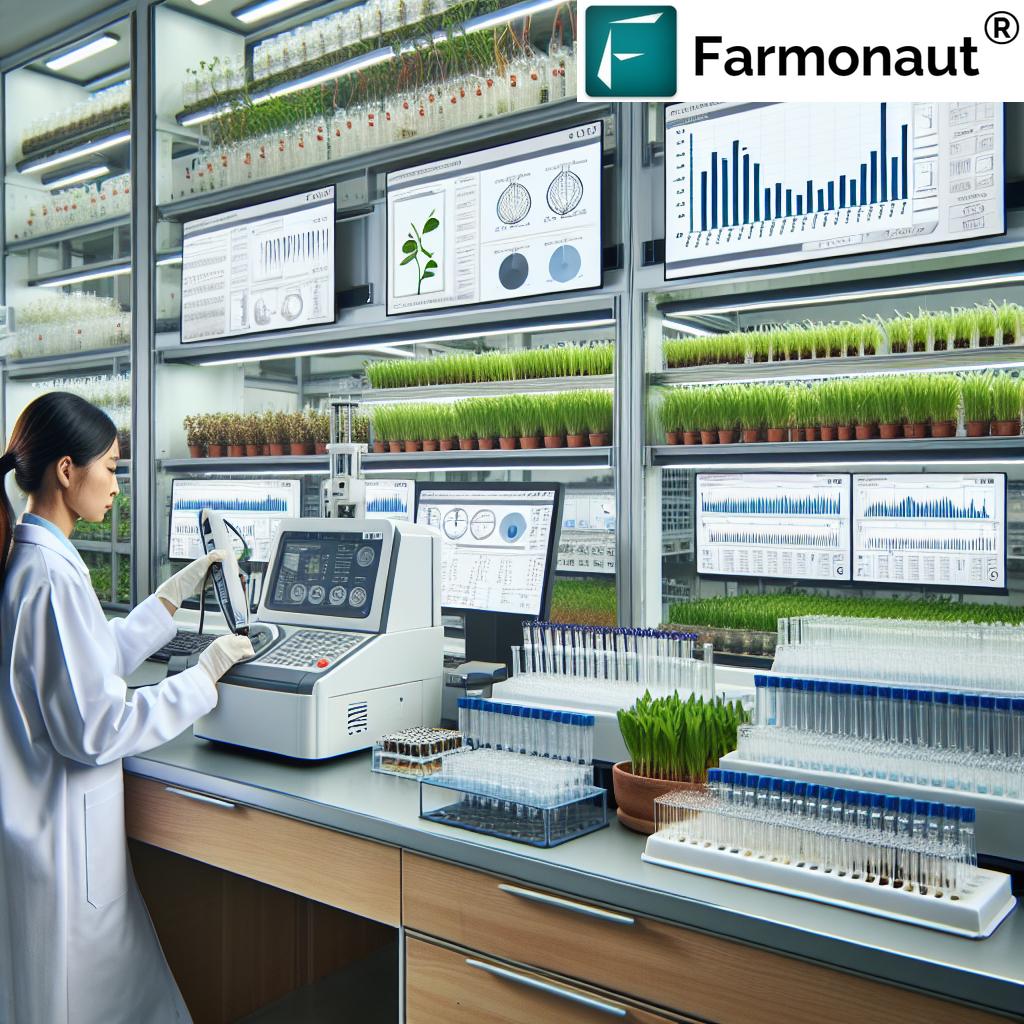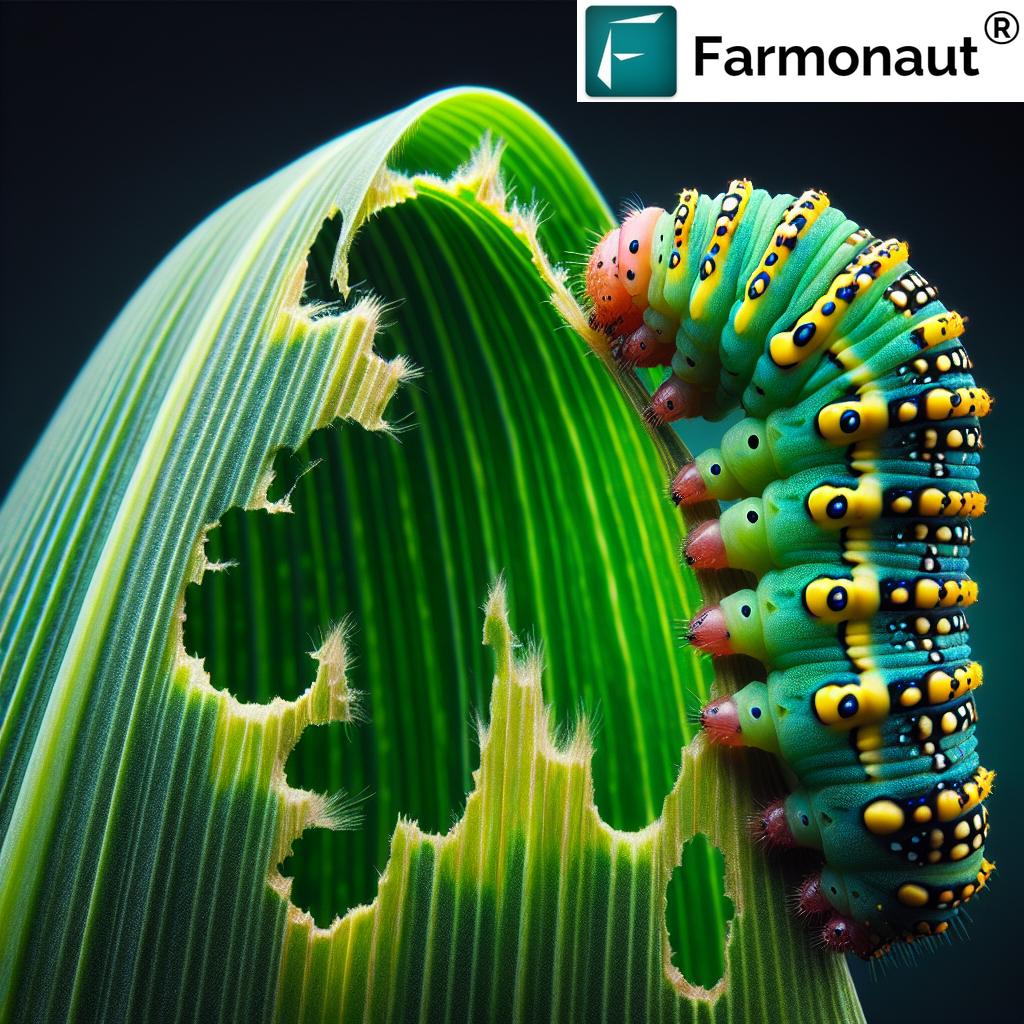Protecting Your Citrus Trees: Understanding and Combating the Black Citrus Aphid (Pulgón Negro de los Cítricos)

At Farmonaut, we understand the challenges that citrus farmers face, especially when it comes to pest management. One of the most persistent and damaging pests in citrus orchards is the black citrus aphid, also known as pulgón negro de los cítricos or pulgón negro limonero in Spanish-speaking regions. These tiny insects can cause significant damage to citrus trees, particularly lemon trees, if left unchecked. In this comprehensive guide, we’ll explore everything you need to know about black citrus aphids and how to protect your valuable citrus crops using modern agricultural technology and sustainable farming practices.
Understanding the Black Citrus Aphid
The black citrus aphid (Toxoptera aurantii) is a small, dark-colored insect that primarily affects citrus trees, with a particular affinity for lemon trees. These pests are notorious for their rapid reproduction and the extensive damage they can cause to young shoots, leaves, and developing fruits.
Identification and Life Cycle
- Appearance: Adult aphids are about 1-2 mm long, with a shiny black or dark brown body.
- Reproduction: They can reproduce both sexually and asexually, with females capable of giving birth to live young.
- Life Cycle: In optimal conditions, the lifecycle from birth to reproductive adult can be as short as 7-10 days.
- Colonies: Aphids tend to form dense colonies on the underside of leaves and on young, tender shoots.
Damage Caused by Black Citrus Aphids
The pulgón negro de los cítricos can cause significant harm to citrus trees in several ways:
- Sap Feeding: Aphids use their piercing-sucking mouthparts to extract sap from plant tissues, weakening the tree.
- Leaf Distortion: Heavy infestations can cause leaves to curl, twist, and become distorted.
- Stunted Growth: Young shoots and developing fruits may be stunted or deformed due to aphid feeding.
- Honeydew Production: Aphids excrete a sticky substance called honeydew, which can lead to the growth of sooty mold on leaves and fruits.
- Virus Transmission: Black citrus aphids can act as vectors for various plant viruses, further compromising tree health.
Monitoring and Early Detection
Early detection is crucial in managing black citrus aphid infestations. At Farmonaut, we emphasize the importance of regular monitoring and the use of advanced technology to identify pest problems before they escalate.
Traditional Monitoring Methods
- Visual Inspection: Regularly examine the underside of leaves, young shoots, and developing fruits for signs of aphid colonies.
- Sticky Traps: Yellow sticky traps can be used to monitor aphid populations and detect early infestations.
- Pruning Observations: Pay close attention to fresh growth during pruning activities, as these are prime targets for aphids.
Advanced Monitoring with Farmonaut’s Satellite Technology
Our satellite-based crop health monitoring system offers several advantages for detecting and managing black citrus aphid infestations:
- Early Detection: Satellite imagery can reveal changes in vegetation health (NDVI) that may indicate pest stress before it’s visible to the naked eye.
- Large-Scale Monitoring: Efficiently monitor vast citrus orchards without the need for time-consuming manual inspections.
- Historical Data Analysis: Compare current crop health with historical data to identify unusual patterns that may signify pest problems.
- AI-Powered Insights: Our Jeevn AI advisory system analyzes satellite data to provide early warnings and management recommendations for potential aphid outbreaks.
To learn more about how our satellite monitoring can revolutionize your pest management strategy, visit Farmonaut’s App.

Integrated Pest Management (IPM) for Black Citrus Aphids
At Farmonaut, we advocate for an Integrated Pest Management (IPM) approach to control pulgón negro limonero and other citrus pests. This strategy combines various control methods to manage pest populations effectively while minimizing environmental impact.
Cultural Control Methods
- Pruning: Regular pruning improves air circulation and reduces hiding spots for aphids.
- Proper Irrigation: Avoid over-watering, as excessive moisture can create favorable conditions for aphid proliferation.
- Nutrient Management: Balanced fertilization prevents excessive soft growth that attracts aphids.
- Sanitation: Remove and destroy heavily infested plant parts to prevent the spread of aphids.
Biological Control
Encouraging natural predators and parasitoids can help keep black citrus aphid populations in check:
- Ladybugs (Coccinellidae): Both adults and larvae are voracious aphid predators.
- Lacewings (Chrysopidae): Their larvae, known as “aphid lions,” feed extensively on aphids.
- Parasitic Wasps: Species like Aphidius colemani lay eggs inside aphids, using them as hosts for their larvae.
- Hoverflies (Syrphidae): Their larvae are effective aphid predators.
To promote biological control, consider:
- Planting nectar-rich flowers near citrus trees to attract beneficial insects.
- Avoiding broad-spectrum insecticides that may harm beneficial insects.
- Using banker plants to provide alternative food sources and habitats for natural enemies.
Chemical Control
When other methods are insufficient, chemical control may be necessary. However, it’s crucial to use pesticides judiciously to minimize environmental impact and prevent the development of resistance:
- Insecticidal Soaps: These are effective against soft-bodied insects like aphids and have low environmental impact.
- Horticultural Oils: Neem oil and other horticultural oils can suffocate aphids while being relatively safe for beneficial insects.
- Systemic Insecticides: In severe cases, systemic insecticides may be used, but should be applied with caution to protect pollinators.
Always follow label instructions and local regulations when applying any pesticides.
Leveraging Farmonaut’s Technology for IPM
Our advanced satellite monitoring and AI advisory system can significantly enhance your IPM strategy:
- Targeted Application: Use our vegetation health maps to identify areas of stress and apply treatments only where needed, reducing overall pesticide use.
- Timing Optimization: Our weather forecasting and pest prediction models help you time interventions for maximum effectiveness.
- Efficacy Monitoring: Track the success of your IPM strategies over time using our historical data analysis tools.
Discover how our technology can elevate your IPM approach by downloading our app:
Sustainable Management Practices for Long-Term Control
At Farmonaut, we believe in promoting sustainable agriculture that balances productivity with environmental stewardship. Here are some long-term strategies to manage black citrus aphids while maintaining a healthy ecosystem:
Crop Diversification
Planting a diverse range of crops and incorporating companion plants can help reduce the impact of pulgón negro de los cítricos:
- Intercropping: Plant aromatic herbs like basil, mint, or rosemary between citrus trees to repel aphids.
- Trap Crops: Use plants that attract aphids away from your citrus trees, such as nasturtiums or mustard greens.
- Biodiversity: Encourage a diverse ecosystem that supports a wide range of beneficial insects and natural predators.
Soil Health Management
Healthy soil promotes robust plant growth, making trees more resistant to pest attacks:
- Organic Matter: Incorporate compost and other organic materials to improve soil structure and microbial activity.
- Cover Crops: Use cover crops to prevent soil erosion, improve nutrient cycling, and provide habitat for beneficial insects.
- Reduced Tillage: Minimize soil disturbance to preserve soil structure and beneficial microorganisms.
Water Management
Efficient water management is crucial for both tree health and pest control:
- Drip Irrigation: Use precision irrigation systems to deliver water directly to the root zone, reducing excess moisture that can attract pests.
- Soil Moisture Monitoring: Utilize Farmonaut’s soil moisture data to optimize irrigation schedules and prevent overwatering.
- Water Quality: Ensure the use of clean, pathogen-free water to prevent the spread of diseases that might weaken trees and make them more susceptible to aphid attacks.
Climate-Smart Agriculture
Adapting to changing climate conditions is essential for long-term pest management:
- Microclimate Modification: Use windbreaks or shade cloth to create favorable microclimates that discourage aphid proliferation.
- Phenology Tracking: Use Farmonaut’s weather data and crop models to track plant development stages and anticipate periods of high aphid risk.
- Adaptive Varieties: Select citrus varieties that are well-adapted to local conditions and have natural resistance to pests and diseases.
Leveraging Technology for Advanced Pest Management
At Farmonaut, we’re committed to integrating cutting-edge technology into traditional farming practices to enhance pest management strategies, including the control of pulgón negro limonero.
Satellite-Based Monitoring
Our satellite monitoring system offers unparalleled insights into crop health and potential pest infestations:
- Multispectral Analysis: Detect changes in plant health that may indicate aphid stress before visible symptoms appear.
- Time-Series Data: Track the progression of potential infestations over time to inform management decisions.
- Large-Scale Monitoring: Efficiently monitor vast citrus orchards without the need for extensive ground surveys.
AI-Powered Advisory System
Our Jeevn AI system combines satellite data with advanced algorithms to provide personalized pest management advice:
- Risk Prediction: Forecast potential aphid outbreaks based on historical data, weather patterns, and current crop conditions.
- Treatment Recommendations: Receive tailored suggestions for pest control measures based on the specific conditions of your orchard.
- Optimization of Resources: Minimize pesticide use by targeting treatments only where and when they are most needed.
Blockchain-Based Traceability
For commercial citrus growers, our blockchain technology offers several benefits in pest management and product quality assurance:
- Treatment Tracking: Record all pest management activities securely on the blockchain for transparency and traceability.
- Quality Assurance: Demonstrate pest-free status and sustainable farming practices to buyers and consumers.
- Compliance Management: Easily maintain and provide records for organic certification or regulatory compliance.
Integration with IoT Devices
While our core technology is satellite-based, we also support integration with IoT devices for enhanced pest monitoring:
- Smart Traps: Connect digital insect traps to our platform for real-time monitoring of aphid populations.
- Weather Stations: Integrate local weather data for more precise pest prediction models.
- Automated Alerts: Receive immediate notifications when sensor data indicates potential pest problems.
To explore how our advanced technology can revolutionize your citrus pest management, visit our Satellite API page or check out our API documentation.
Comparative Advantages of Farmonaut’s Satellite System
When it comes to managing pests like the pulgón negro de los cítricos, having the right monitoring tools is crucial. Here’s how Farmonaut’s satellite-based system compares to other technologies:
| Feature | Farmonaut Satellite System | Drone-Based Monitoring | IoT-Based Sensors |
|---|---|---|---|
| Coverage Area | Large-scale (entire farms/regions) | Limited by flight time and regulations | Limited to sensor placement areas |
| Frequency of Data Collection | Regular intervals (1-5 days) | As needed, but labor-intensive | Continuous, real-time |
| Initial Setup Cost | Low (subscription-based) | High (equipment purchase) | Moderate to High (sensor network) |
| Maintenance Requirements | Minimal (cloud-based system) | High (equipment maintenance, pilot training) | Moderate (sensor maintenance, battery replacement) |
| Data Analysis Capabilities | Advanced (AI-powered insights) | Varies (depends on software) | Basic to Advanced (depends on system) |
| Weather Independence | High (can penetrate cloud cover) | Low (affected by wind, rain) | Moderate (some weather sensitivity) |
| Scalability | Highly scalable | Limited scalability | Moderately scalable |
| Integration with Other Data Sources | Extensive (weather, soil, historical data) | Limited | Moderate |
As you can see, Farmonaut’s satellite-based system offers unique advantages in terms of coverage, cost-effectiveness, and data integration capabilities, making it an ideal choice for comprehensive pest management in citrus orchards.
Future Trends in Citrus Pest Management
As we look to the future, several emerging trends and technologies are set to revolutionize how we manage pests like the black citrus aphid:
1. Precision Agriculture and AI
Advancements in AI and machine learning will enable even more precise predictions of pest outbreaks and personalized treatment recommendations. Farmonaut is at the forefront of this trend, continuously improving our AI models to provide increasingly accurate and timely advice.
2. Gene Editing and Resistant Varieties
CRISPR and other gene-editing technologies may lead to the development of citrus varieties with enhanced natural resistance to aphids and other pests, reducing the need for chemical interventions.
3. Biopesticides and Biocontrol Agents
Research into novel biopesticides and more effective biocontrol agents is ongoing. We may see new, highly targeted biological solutions for controlling pulgón negro de los cítricos in the coming years.
4. IoT and Sensor Integration
While satellite monitoring remains core to our approach, integration with ground-based IoT sensors will provide even more detailed, real-time data on pest populations and crop health.
5. Climate Change Adaptation
As climate patterns shift, pest behaviors and life cycles may change. Advanced modeling and monitoring systems will be crucial in adapting pest management strategies to these new realities.
6. Robotics and Automation
Autonomous robots for pest scouting and precision pesticide application may become more common, further reducing labor costs and improving treatment efficacy.
Frequently Asked Questions (FAQ)
Q1: How quickly can black citrus aphids damage my lemon trees?
A1: Black citrus aphids (pulgón negro limonero) can reproduce rapidly under favorable conditions. Significant damage can occur within 2-3 weeks of initial infestation if left unchecked.
Q2: Are there any natural predators of black citrus aphids?
A2: Yes, several natural predators can help control aphid populations, including ladybugs, lacewings, hoverflies, and parasitic wasps. Encouraging these beneficial insects in your orchard can be an effective part of an IPM strategy.
Q3: How often should I monitor my citrus trees for aphids?
A3: Regular monitoring is crucial. We recommend visual inspections at least once a week during the growing season. With Farmonaut’s satellite monitoring, you can receive updates on crop health every 1-5 days, allowing for even more frequent monitoring.
Q4: Can black citrus aphids transmit diseases to my citrus trees?
A4: Yes, black citrus aphids can act as vectors for several plant viruses, including Citrus Tristeza Virus (CTV). This is one of the reasons why early detection and control are so important.
Q5: How does Farmonaut’s satellite monitoring detect aphid infestations?
A5: Our satellite technology doesn’t directly detect aphids, but it can identify changes in vegetation health (NDVI) that may indicate pest stress. These early warning signs allow for timely intervention before visible damage occurs.
Q6: Is it possible to control black citrus aphids without chemical pesticides?
A6: Yes, many organic and IPM strategies can effectively control aphid populations without relying on chemical pesticides. These include biological control, cultural practices, and the use of organic-approved substances like neem oil or insecticidal soaps.
Q7: How can I integrate Farmonaut’s technology into my existing pest management practices?
A7: Farmonaut’s platform is designed to complement and enhance existing practices. You can start by using our satellite monitoring to guide your scouting efforts and timing of interventions. As you become more familiar with the system, you can incorporate our AI-powered recommendations into your decision-making process.
Q8: Are there specific weather conditions that favor black citrus aphid outbreaks?
A8: Yes, black citrus aphids tend to thrive in mild temperatures (20-25°C) and high humidity. Our weather forecasting feature can help you anticipate conditions that might lead to population increases.
Q9: How does Farmonaut’s technology compare to traditional pest monitoring methods?
A9: While traditional methods like visual inspection remain important, Farmonaut’s technology offers several advantages: it covers large areas quickly, provides consistent data over time, and can detect stress before it’s visible to the naked eye. It’s best used in combination with ground-level observations for comprehensive pest management.
Q10: Can Farmonaut’s system help me reduce pesticide use in my citrus orchard?
A10: Absolutely. By providing early detection of potential pest issues and allowing for targeted interventions, our system can help you apply pesticides only where and when they’re needed, potentially reducing overall pesticide use while maintaining effective pest control.
Conclusion
Managing black citrus aphids (pulgón negro de los cítricos) is a critical challenge for citrus growers worldwide. By combining traditional IPM practices with advanced technologies like Farmonaut’s satellite monitoring and AI-powered advisory systems, farmers can achieve more effective, sustainable, and cost-efficient pest control.
Remember, successful management of pulgón negro limonero requires a holistic approach that considers the entire agroecosystem. Regular monitoring, promoting biodiversity, maintaining soil and plant health, and using targeted interventions when necessary are all key components of a successful strategy.
At Farmonaut, we’re committed to empowering farmers with the tools and knowledge they need to protect their citrus crops while promoting sustainable agriculture. By leveraging our advanced satellite technology and data-driven insights, you can stay one step ahead of pest problems and optimize your orchard management practices.
Ready to revolutionize your approach to citrus pest management? Explore our solutions and start your journey towards more efficient and sustainable farming today.
Join the growing community of forward-thinking citrus growers who are harnessing the power of technology to combat pests like the black citrus aphid. With Farmonaut, you’re not just fighting pests – you’re cultivating a smarter, more sustainable future for citrus farming.



